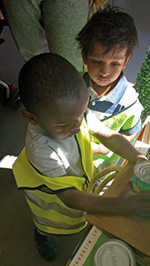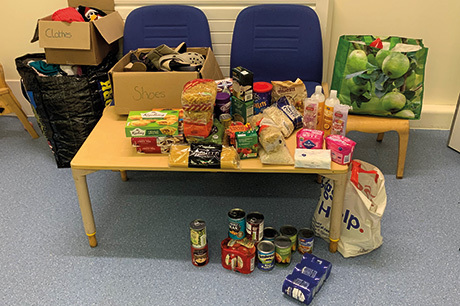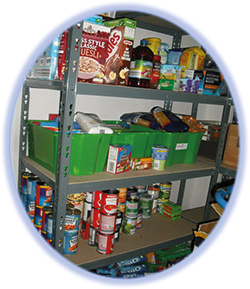
Download the PDF of this article
Finding themselves in increasingly desperate financial circumstances, many families with young children are continuing to turn to nurseries for help. A National Education Union (NEU) poll of 1,026 teachers in England this year found 40 per cent are having to provide extra items for children because of what the union called ‘Dickensian’ levels of poverty.
Much has been made of the Department for Education’s programme to target ‘holiday hunger’ last summer, but plans to run a similar Easter pilot this year have been dropped.
Emma Lewell-Buck, MP for South Shields and former shadow minister for children and families, argues the programme does not go far enough, calling it a ‘short-term, piecemeal measure’.
She adds, ‘Of course, the programme was welcome, but it does not acknowledge the problem exists outside the holiday period, and affects parents too. What do people do for the other 40-odd weeks of the year?’
 With pressure on food banks rising and 30 per cent of UK children living in poverty, settings such as Marks Gate Children’s Centre Nursery in Dagenham, run by the London Early Years Foundation (LEYF), are plugging the gaps by providing handouts.
With pressure on food banks rising and 30 per cent of UK children living in poverty, settings such as Marks Gate Children’s Centre Nursery in Dagenham, run by the London Early Years Foundation (LEYF), are plugging the gaps by providing handouts.
‘Parents can get food bank vouchers from the community centre nearby, but they are limited to three times in six months, maybe because food banks themselves are struggling,’ says manager Gemma Morris. ‘They can collect vouchers on Fridays, but the food bank isn’t actually open till Tuesday. As we get a supermarket delivery every Monday, we try to put a bit extra in our weekly shop and give out as much surplus as we can on Fridays.’
Work and Pensions Secretary Amber Rudd recently conceded Universal Credit has contributed to an increase in food bank use. The Trussell Trust found that in areas where Universal Credit was introduced, its food banks saw a 52 per cent increase in demand in the first 12 months.
Ms Morris explains, ‘Some of our parents have been struggling financially with no food in the cupboards. A lot of this is down to Universal Credit and having to wait five weeks for first payments. It has been a big issue for a lot of our parents, and some of our staff too. The issue of child poverty has been a concern for a long time, but since the introduction of Universal Credit we’ve seen an alarming rise in parents asking for support.’
GOVERNMENT SURVEY
The Department for Work and Pensions has announced it will measure food insecurity from April 2019, as part of its annual Family Resources Survey. Ms Lewell-Buck, who is also a member of the APPG on Hunger, calls the decision a ‘step in the right direction’.
‘They won’t specifically measure children, but from data provided they will extrapolate how many food-insecure households include children,’ she says. ‘With this, we can at least prove the problem is widespread and desperate, and we can draw a direct link [to] policies like Universal Credit.
‘What’s sad is this is not something that can’t be solved. However, right now, many food banks are run by faith groups, charities and other organisations which are not a sustainable part of the welfare state.’
SENSITIVE AND TRICKY
Eunice Lumsden, head of early years at the University of Northampton, recommends every setting provides a quiet space with food and water available for all children, rather than explicitly identifying those who need it. She adds that poverty can be addressed by speaking to staff about expectations.
‘Our staff have low wages and are sometimes living in poverty too, so it is a very sensitive and tricky area. People make judgements and can get into parent blaming, so we need to help understanding of how parents spend their money. Sometimes getting children new trainers is what they feel is socially acceptable, even while they are struggling to feed them. It’s important to be aware of this rather than blaming parents for not using their money wisely.’
Dr Lumsden advocates ‘poverty-proofing’ settings to make children less aware of disadvantage.
‘It’s complicated because in the early years we are a mixed economy. But being poverty-aware is being child-aware. On World Book Day, settings should support families by providing the resources to develop their outfits at nursery, not relying on parents’ input at home. Staff should stop parents bringing in presents or food for birthdays. The tooth fairy shouldn’t exist, nor should graduation ceremonies. They are all about money.
‘If your setting is inclusive and values-driven, knows its own community and understands how they live, that should drive practice.
‘Often, generational cycles in families run very deep, and it can be hard to shift the impact of parents and break the cycle of deprivation. But there is still so much we can do to make all children feel like little pots of gold.’
CASE STUDY: Marks Gate Children's Centre Nursery
Gemma Morris, nursery manager

‘We are in Barking, the fourth-most-deprived borough of London, and see a lot of disadvantage, but we try to make our response as respectful as possible.
‘Members of staff donate food and we use Clubcard points to get parents things like nappies.
‘We keep everything in a discreet area of the nursery and leave bags out so people can take the maximum they need without feeling embarrassed. We don’t hover over them. We’ve also turned to parents who can afford to help us. One parent buys a full grocery shop for us every month.
‘We have introduced a “reverse Lent”, so rather than giving up items, people bring things in for others. We’ve also set up a clothes bank, encouraging parents to swap anything that no longer fits.
‘Typically, none of this would be the role of a nursery, but we have to put our children and families first.’
CASE STUDY: Broomloan Nursery, Glasgow
Maggie Frater, team leader

‘In the past two years, we’ve noticed a dramatic difference, with parents less able to cope. We’re very community-spirited here anyway, and for a long time parents helped each other, passing on clothes, buggies or toys. But there were bigger issues. A mother who was an asylum-seeker came in saying she felt sick and dizzy. It turned out she hadn’t eaten for three days. She had just run out of money.
‘Then one of our four-year-olds drew a picture of someone crying. Her key worker asked what was happening and she said, “My mum is crying because she doesn’t have food in the house.” Her biggest worry should be not having the right colour to paint with, not that her mum is at home crying. I don’t know if any one thing is to blame, but Universal Credit for the initial five weeks is awful. When you have children at home who need nappies and food and there are bills to pay, the expectations are just unreal.
 ‘I sent begging letters out to local businesses who helped us get a food bank set up. We have a taking table with leftover food provided by Tesco and Greggs.
‘I sent begging letters out to local businesses who helped us get a food bank set up. We have a taking table with leftover food provided by Tesco and Greggs.
‘Poverty is never going to go away, so we have to be proactive. We’re far from the only nursery that does this, but for us it’s not a political statement, it’s purely humanitarian.’
MORE INFORMATION
- Living Hand to Mouth: Children and Food in Low-Income Families, Child Poverty Action Group, www.cpag.org.uk
- More than half of poor children in the UK are under five









